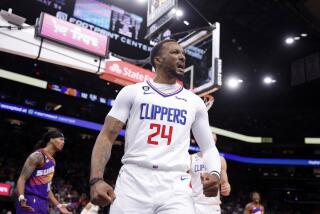Soldier-Turned-Statesman Voyages Back to Vietnam
HANOI — He landed in Vietnam for the first time on Christmas Day 1962, a young Army captain deeply committed to fighting communism. As an advisor to South Vietnamese troops, his office was a thatched hut with a dirt floor, his bed a bamboo cot.
He spent mornings on patrol for Viet Cong guerrillas, moving through clouds of insects, picking off leeches, hacking down peasants’ crops along the way to deny food to the enemy--and getting ambushed almost daily.
“I had no qualms about what we were doing. This was counterinsurgency at the cutting edge,” he recalled in his autobiography.
On Tuesday, almost 40 years later, Colin L. Powell returned for the first time since the Vietnam War ended, this time as America’s top diplomat, committed to repairing relations with a country that dealt the United States its most decisive and humiliating military defeat.
Powell’s journey reflects how relations between the two former enemies have evolved in the quarter-century since the war ended. While ties have formally improved, both sides are still struggling with lingering memories and deep political differences.
Powell’s Vietnam experience also provides context for Bush administration policy in conflicts and hot spots far from this tropical country.
The approach, known as the Powell Doctrine, calls for not getting involved or committing troops to a conflict unless there are enough to win. It also calls for developing a viable end-game strategy. Both were flaws in the U.S. intervention in Vietnam.
The effect of Powell’s Vietnam experience was visible in his strategy during the 1991 Persian Gulf War, when he was chairman of the Joint Chiefs of Staff, and it is at the center of the cautious U.S. strategy he is crafting as a statesman in the Balkans today.
Like the United States, Powell in some ways remains trapped between the past and the future in Vietnam. He clings to the rightness of the original mission that brought him here for two tours of duty in the 1960s. “I would never say to those young men and women who, as I, were veterans, that it was the wrong cause in the beginning,” he told NBC’s “Meet the Press” last year on the 25th anniversary of the war’s end.
Despite the loss of 58,000 American lives, Powell insisted, “It wasn’t a loss in vain.”
He also had harsh words during that TV appearance for the government that is now hosting him at a meeting of the Assn. of Southeast Asian Nations. He called Vietnam a “tyrannical regime” that was going to be left behind as the rest of the world moves into the 21st century “because they hold fast to old concepts of government.”
“It’s too bad we didn’t win,” he said on “Meet the Press.” “It would have been a better nation now if we had.”
Powell, who lost several close friends and fraternity brothers during the war, said shortly before leaving for Asia on this trip that he had no ghosts needing exorcism in Vietnam. Yet he acknowledged that he expected the visit to “peel back” the decades and to produce “powerful and strong” emotions.
“I go as the secretary of State, but I also go as a former battalion advisor, a former operations officer of an American infantry division, and a soldier who fought there. I am sure there will be a flood of emotions when I return,” he told reporters.
In Vietnam, Powell received his only war injury of his 35-year military career, when he stepped on a poisoned punji stick that penetrated deep into his foot and ended his days at the front.
During his visit here, Powell will meet with teams trying to account for American troops still missing in action.
“We have an obligation to the families, an obligation to those men to get the fullest possible accounting of what happened to them. We should do everything that we can to recover them. So there will be no backing off,” Powell said.
Earlier this year, a helicopter carrying members of a joint U.S.-Vietnam mission searching for the remains of Americans lost during the war crashed. Seven Americans--including the incoming and outgoing unit commanders--and nine Vietnamese were killed.
Powell also will be discussing the lasting impact of Agent Orange, the toxic defoliant used during his second tour.
“We have been open to joint scientific inquiry as to the consequences of Agent Orange on human beings and livestock and the environmental and ecological damage,” Powell said en route to Asia. He acknowledged, however, that the United States has not gotten as far as it would like on the scientific issues.
But Powell is also trying to look forward, to let Vietnamese know that the United States wishes to be friends and to “resolve the issues of the past.”
“The war didn’t turn out the way we expected it to, or wanted it to, or perhaps should have, but that is now history. We have to look forward,” he said at a State Department briefing before leaving.
“I hope we can encourage them to move forward with reform and openness,” he added.
In an irony of history, Vietnam now needs the United States--in part because of the war. After losing more than a million people in the conflict, including vast numbers of young, Vietnam experienced a population explosion from 47 million when the war ended in 1975 to about 80 million today. The population is now forecast to increase by more than a million a year for the next decade, according to Vietnamese officials.
The government must create up to 1.4 million jobs a year to accommodate the young people entering the work force. It also has to deal with a 33% malnutrition rate among children, according to the U.N. Children’s Fund.
Foreign investment is critical to spur growth, create jobs and address social problems. Vietnam’s best hope for all three lies in a trade agreement with the United States that now awaits ratification in both countries.
Breaking with the past may require more than diplomatic relations and increased trade, Powell conceded. During his three-day visit here, he said he’d also like to explore Hanoi to make personal contact with people he once viewed as the enemy.
“I’d love to walk around,” he told reporters. “Perhaps I’ll find a moment or two to at least walk around the streets and see some people, maybe get a chance to talk to some people on the street. I would love to do that.”
More to Read
Sign up for Essential California
The most important California stories and recommendations in your inbox every morning.
You may occasionally receive promotional content from the Los Angeles Times.










